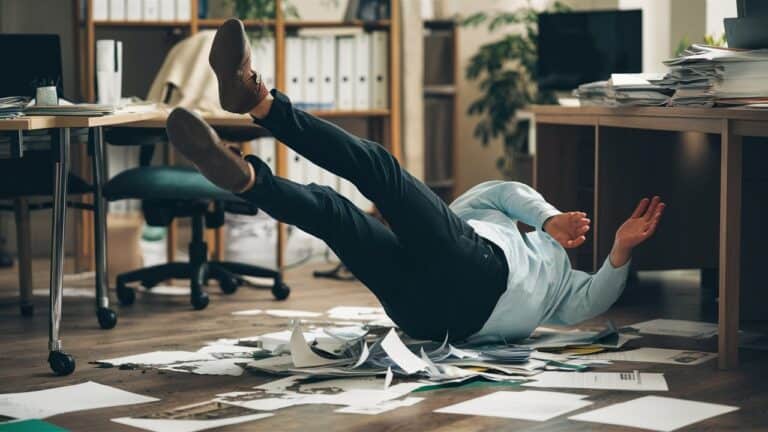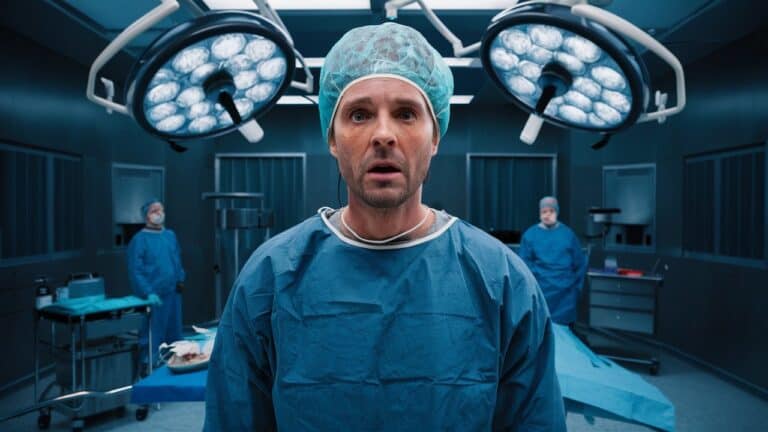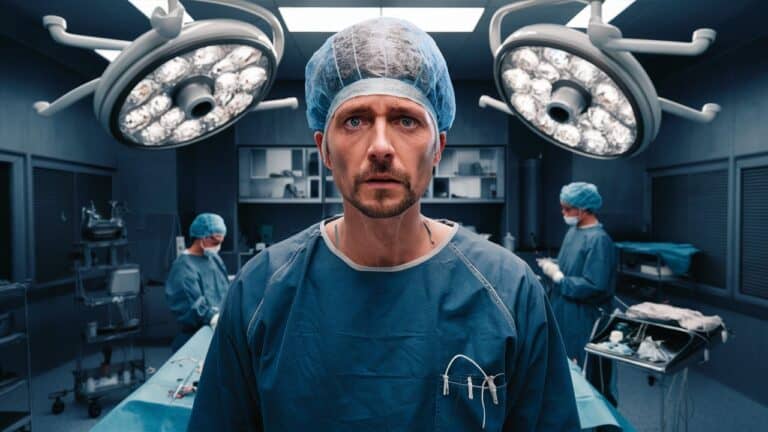Have you ever experienced the adrenaline-filled chaos of being caught in a motorcycle crash? We will review the steps to take after a motorcycle accident in this article.
If you’re a motorcycle rider, the chances are that you’ve at least brushed with this terrifying reality. When it comes to navigating those heart-stopping moments after a motorcycle accident, there’s often little room for error.
Your head is buzzing, your pulse racing – but what next?
We all hope we’ll never need to answer that question. But being prepared can make all the difference when seconds count and clear thinking matters most.
This post will equip you with practical steps to take after a motorcycle accident. You’ll learn how immediate medical attention can potentially save lives, why gathering evidence at the crash scene is crucial and how consulting an injury attorney might just protect your legal rights.
Seems worth a deeper exploration, no?
Table Of Contents:
- Understanding the Importance of Taking Immediate Action
- Ensuring Your Safety and Well-being
- Contacting Law Enforcement and Gathering Information
- Consulting with a Motorcycle Accident Lawyer
- Filing an Injury Claim and Dealing with Insurance Companies
- Documenting and Preserving Evidence for Legal Purposes
- Seeking Compensation for Motorcycle Injuries
- FAQs in Relation to Steps to Take after a Motorcycle accident
- Conclusion
Understanding the Importance of Taking Immediate Action
A motorcycle accident can be a harrowing experience. Yet, it’s crucial to act swiftly and smartly right after an incident for your safety and future legal proceedings. Your immediate actions at the accident scene may influence how well you recover from any personal injuries or property damage.
The Role of Medical Attention in Post-Accident Recovery
It is essential to prioritize your health; don’t hesitate to seek medical care, even if you feel alright. Some motorcycle injuries aren’t apparent but might manifest later with potentially severe consequences. Don’t gamble with your wellbeing—get checked out by a professional as soon as possible.
Staying at the crash location could put you in harm’s way again because other roadway users might not see you clearly, especially under poor lighting conditions or bad weather situations (BikerSOS). Moreover, never try removing gear without proper help; doing so can lead to more damage than good when done improperly due to potential underlying injuries.
Furthermore, having prompt medical treatment will give necessary documentation for injury claims. This record establishes a link between the accident and your injuries—a key aspect when filing for compensation related to accidents caused by another party’s negligence.
Maintaining Presence of Mind: Gathering Evidence & Reporting The Incident
Another vital step is reporting the incident promptly (Eat Sleep Ride). Let law enforcement officers know about what happened while everything is still fresh—not only does this set into motion official protocols that safeguard everyone involved but also provides impartial reports on details like who was present during the mishap or how it unfolded.
- Contact local police: It helps ensure that all facts are properly recorded from both parties’ perspectives.
- Gather information: Collect personal details from the other involved parties, such as names, addresses, phone numbers, and insurance company details. This information is essential for filing an accident report or making claims.
- Document everything: Capture images of the crash scene if it’s safe to do so; these pictures could be valuable evidence later on. Make sure you also jot down any specific observations about weather conditions or peculiarities about the roadway that may have contributed to your motorcycle crash.
Ensuring Your Safety and Well-being
Your safety is paramount when you’re on the road, especially as a motorcycle rider. There are several crucial steps that can help keep you safe before, during, and after your ride.
Importance of Wearing Safety Gear
The first line of defense against severe injuries in any crash scene is wearing appropriate safety gear. The right equipment can significantly reduce risks associated with road rash or even more serious conditions like broken bones. According to the NHTSA, helmets can reduce head injury risks by a substantial 69%.
Besides helmets, other essentials include jackets reinforced with armor plating for extra protection against abrasions and impacts. Also consider boots designed specifically for motorcyclists – they offer better traction than regular footwear plus protect your feet from heat emitted by the engine.
Gloves not only improve grip but also shield hands from flying debris while riding at high speeds. Eye protection comes in handy too because it shields riders’ eyes from dust particles or insects that could cause distraction leading to an accident.
Adhering to Speed Limits and Road Signs
Maintaining a safe speed gives you more time to react if something unexpected happens – like another vehicle changing lanes without signaling or sudden obstacles appearing on your path due to bad weather conditions etcetera. Safety isn’t just about protective gear; respecting traffic rules plays an equally important role.
You may feel tempted sometimes to exceed speed limits particularly on open highways but remember: going faster doesn’t necessarily mean getting there sooner.
According to the NHTSA, speed was a factor in 31% of all fatal motorcycle crashes. It’s clear that staying within speed limits is not just law, it’s life-saving.
Take heed of the signs – they exist for a purpose. They provide vital information such as upcoming turns or intersections, warning about potential hazards like school zones where children may suddenly run onto the street without looking etcetera.
Basically, play it safe. Slow down and follow the rules.
Safety First: Your safety on the road is crucial. Wearing the right gear like helmets, jackets with armor plating, specific boots, gloves and eye protection can significantly reduce injury risks. Respect traffic rules too – maintain safe speeds and heed road signs for a safer ride.
Contacting Law Enforcement and Gathering Information
But once you’ve ensured that you’re okay, the next crucial step is to alert law enforcement officers. Dial 911 right away so they can respond to the scene promptly.
Your local police department will not only secure the accident site but also prepare an official report which becomes invaluable when dealing with insurance companies or legal proceedings down the line.
Remember this golden rule: don’t admit fault until all facts have been established by professionals. Even if it feels like a clear-cut situation where blame might fall on you, resist jumping into conclusions without careful analysis first. It’s natural for emotions to run high after an accident but being too hasty could put your claim at risk.
Gathering Crucial Details at The Scene
The aftermath of any traffic incident may be chaotic, and important details can easily get lost in confusion. Therefore, getting as much information as possible from everyone involved – including witnesses – is key for both immediate help and future reference. ActivBeacon offers excellent advice on how best to gather such data post-accident.
You should jot down driver’s license numbers along with their full names and contact info (including phone number). Also note vehicle make/model plus its license plate number; ask about each party’s insurance company policy details too since these are vital for filing claims later on.
Maintaining Emergency Contacts Handy
A solid emergency contact list doesn’t just include family members or friends who live nearby – think wider. Consider adding people like personal injury attorneys specializing in motorcycle accidents because having them in speed dial might prove handy one day if unfortunate events unfold unexpectedly. ActivBeacon provides a fantastic tool that lets you store all your emergency contacts in one place. That way, when an accident happens, and you’re feeling overwhelmed, help is just a tap away.
Basically, reaching out to the cops after a motorcycle mishap isn’t just about ticking legal boxes. It’s also laying the foundation for any possible injury claims.
When you’re in a motorcycle crash, make sure you’re safe first. Next, call 911 and wait for the cops to get there and write up their report. Don’t say it’s your fault until all the details are clear. Gather as much information as you can from everyone involved – it could come in handy later on. And keep important numbers close by, like your personal injury lawyer – they might just save the day.
Consulting with a Motorcycle Accident Lawyer
When it comes to navigating the aftermath of a motorcycle accident, seeking legal help can be as critical as medical attention. A seasoned motorcycle accident lawyer, well-versed in injury law, is your ally in this challenging journey.
 Jason A. Plotkin, Esq. Founder of MotorcycleTalks
Jason A. Plotkin, Esq. Founder of MotorcycleTalks
Their expertise goes beyond general legal knowledge; they understand the unique challenges that motorcycle riders face and are equipped to protect your rights against insurance providers or any party trying to pin blame on you unfairly.
The Importance of Legal Help After an Accident
A personal injury lawyer plays a vital role after an accident. First off, their advice helps prevent self-incrimination when interacting with law enforcement officers and insurance companies. It’s not uncommon for victims unknowingly admit fault while recounting events under stress. The right guidance ensures you provide necessary details without jeopardizing your claim.
Besides guiding interactions post-crash, lawyers help gather crucial evidence from the crash scene and medical records reflecting injuries suffered—elements that strengthen claims significantly. They know what pieces fit where in the puzzle called ‘legal process,’ ensuring nothing gets overlooked or mishandled.
Fighting For Your Rights Against Insurance Companies
Insurance providers might seem supportive initially but remember: they’re businesses aiming for profitability over payouts wherever possible. An experienced injury lawyer understands these tactics and will stand firm against lowball settlement offers, fighting tooth-and-nail for fair compensation covering all aspects – from property damage to psychological trauma.
Without legal representation, you could be shortchanged out of the compensation that is rightfully yours. Your lawyer will meticulously analyze every aspect to calculate rightful compensation that covers current and future medical expenses, lost wages, and more.
How an Accident Lawyer Helps You Navigate the Legal Maze
After a motorcycle crash, untangling the knot of legal issues can feel like too much. It’s even tougher when you’re nursing serious injuries or mourning someone you’ve lost. But don’t worry, this trusted is here to help.
Securing legal help following a motorcycle accident is as crucial as getting medical care. A proficient attorney safeguards your rights, steers you in dealings with the cops and insurance folks, and collects key evidence to bolster your claim. They’ll battle for just compensation against insurers who may attempt to undercut you. Remember, wading through the legal aftermath of an accident needn’t be overwhelming.
Filing an Injury Claim and Dealing with Insurance Companies
When you’re involved in a motorcycle crash, dealing with insurance companies can be overwhelming. The process of filing an injury claim involves numerous steps that require your attention and understanding.
Notifying your insurance company about the crash should be done right away, as any delay could affect your claim. It’s essential not to delay this as it could impact your claim later on.
Contacting Your Insurance Provider
To start off, call up your insurance provider promptly after the accident has occurred. This might seem intimidating but remember, they are there to help you navigate through this tough time. You’ll need to give them information about what happened during the incident along with any medical treatment received due to injuries suffered.
This initial contact will set the ball rolling for further interactions down the line so make sure all details provided are accurate. According to Pinder Plotkin Law Firm, failing to provide precise details may lead traffic safety administration or other enforcement officers investigating into believing that you’re at fault even when you aren’t.
Gathering Essential Documentation
Your next task would involve collecting necessary documents such as police reports from local law enforcement officers present at the scene of motorcycle accidents and bills related pertaining medical attention sought immediately after these incidents have taken place. These papers will serve crucial evidence should legal disputes arise between parties’ insurances providers later on down road where one side tries shift blame onto other party unjustly so gather every piece paper work which may come handy future claims proceedings.
Hiring A Personal Injury Attorney
A personal injury attorney can also play a pivotal role in helping secure fair compensation for lost wages, medical bills and more caused by severe injuries from a car accident or similar scenarios involving motorcycles riders who’ve been wronged due someone else’s negligence. A qualified personal injury lawyer can help guarantee that your privileges are maintained throughout the intricate legal process.
A competent personal injury attorney will help ensure that the insurance companies treat you fairly and do not attempt to minimize or deny your claim unjustly. According to Pinder Plotkin Law Firm, having a motorcycle accident lawyer by your side is crucial for protecting your rights and seeking fair compensation in these circumstances.
After a motorcycle crash, immediately notify your insurance company and provide accurate details of the incident. Gather crucial documents like police reports and medical bills to support your claim. Hiring a personal injury attorney can help you navigate through complex legal proceedings, safeguarding your rights while ensuring fair compensation.
Documenting and Preserving Evidence for Legal Purposes
In the wake of a motorcycle crash, it is important to quickly and thoroughly collect evidence from the scene in order to assist both your case and law enforcement. Amidst all this confusion, it’s vital to gather evidence at the accident scene as meticulously as possible.
Gathering substantial evidence doesn’t just help your case; it also assists law enforcement officers in piecing together what happened. One of the first crucial steps is making sure not to move your motorcycle after an accident unless necessary for safety reasons. Moving your bike could unintentionally compromise essential pieces of evidence which might make a difference when dealing with insurance companies or legal proceedings.
The Role of Mobile Apps
In today’s tech-savvy world, several mobile apps have been designed specifically to aid motorcyclists during these stressful times. REALRIDER, for example, automatically detects if you’ve had an accident and sends an alert message along with GPS location data directly to emergency services within minutes.
Another handy tool is Collision Call. This app enables immediate contact with local police departments by pressing one button on your smartphone screen while simultaneously recording ambient sounds – serving dual purposes: asking for help and preserving audio clues about how events unfolded.
Recording Personal Injuries & Property Damage
Your personal injuries need documenting too. Even minor road rash or small broken bones should be photographed because they’re proof of injuries suffered due to the incident. Medical records will back up photographic documentation by providing more detailed information about any medical attention sought after the mishap – these will be valuable for both insurance claims and legal purposes.
Next, don’t forget to record any property damage. Your motorcycle rider gear might also have suffered some wear and tear in the accident – capture it all. Even minor dents or scratches on your bike can play a significant role when you seek compensation for damages incurred during the crash scene.
The Importance of Witnesses
Did anyone see what happened? If so, try to get their contact info. Their stories can give more insight into the whole situation.
After a motorcycle crash, carefully collecting evidence is crucial. Don’t move your bike unless for safety reasons and use tech like REALRIDER or Collision Call to get help and record the scene. Document all injuries, no matter how minor, and any property damage – every detail counts. Lastly, reach out to witnesses; their stories can provide extra context.
Seeking Compensation for Motorcycle Injuries
Experiencing the results of a motorcycle crash can be overwhelming. Medical bills pile up and time off work could lead to lost wages. The question that rings loud is: How do I get compensation for these losses? Here’s where we come in.
The Basics of Seeking Compensation
To start, it’s important to know that compensation often comes from the at-fault party’s insurance company. This might seem straightforward but trust us, it’s not as easy as it sounds. Insurance companies are known for their shrewdness when dealing with injury claims after accidents.
This process usually involves presenting your medical records and other documentation to substantiate your claim. These documents show the extent of injuries suffered which directly impacts how much you’ll receive as compensation.
Navigating Insurance Companies
We have all heard stories about insurance companies giving claimants a hard time – but don’t worry. With our help navigating this terrain becomes easier than ever before.
Your first interaction will likely involve an adjuster who reviews accident details on behalf of their employer (the insurer). They’re looking out for one thing – saving money. But remember, they’re just doing their job like anyone else.
National Highway Traffic Safety Administration data shows that per mile traveled, motorcyclists are 28 times more likely than passenger car occupants to die in traffic crashes.
“Your odds aren’t great if you ride motorcycles,” says Jason Plotkin CEO at PinderPlotkin.com “but being informed helps level the playing field.”
Filing Your Injury Claim: Step by Step
Inform your insurance provider as soon as possible about the mishap in order to protect your claim from any potential risks of delay. Make sure you do this promptly, as delaying could jeopardize your claim.
Next, gather all relevant documents including medical records and police reports. These will be essential in proving liability and damages suffered.
Handling the fallout from a motorcycle wreck can be hard, especially when you’re faced with mounting medical bills and lost earnings. It’s key to know that usually, it’s the insurance company of the party at fault who foots the bill. But watch out – they aren’t a walk in the park. Showcasing your medical records and other paperwork is crucial for backing up your injury claims.
FAQs in Relation to Steps to Take after a Motorcycle accident
What to do after being in a motorcycle accident?
First, make sure you’re safe and call for medical help. Then, contact the police and gather information from all parties involved at the scene.
What not to do after a motorcycle accident?
Avoid admitting fault or moving your bike before documenting evidence. Don’t skip out on getting checked by healthcare professionals either.
How long are you sore after a motorcycle accident?
Soreness varies depending on injury severity, but typically lasts anywhere from several days to weeks. Always follow up with your doctor for advice.
Should I get back on a motorcycle after an accident?
This is a personal choice, but consider seeking professional counseling if you experience fear or anxiety about riding again.
Conclusion
When the unforeseen transpires, how you respond can have a massive impact. Understanding those crucial steps to take after a motorcycle accident is vital for every rider.
From getting immediate medical attention and gathering evidence at the crash scene, you’ve now got these covered. These aren’t just tips – they’re life-saving advice!
Your safety matters most; it’s clear that wearing appropriate gear and respecting traffic rules could save you from severe injuries.
Contacting law enforcement quickly ensures an accurate report while consulting with a lawyer protects your rights. And remember: dealing wisely with insurance companies can help secure fair compensation for any losses suffered.
The path may be daunting but armed with this knowledge, ride on – prepared and confident!





